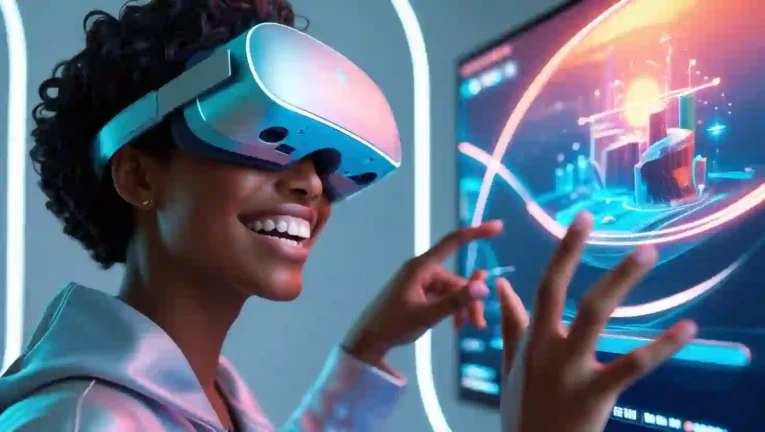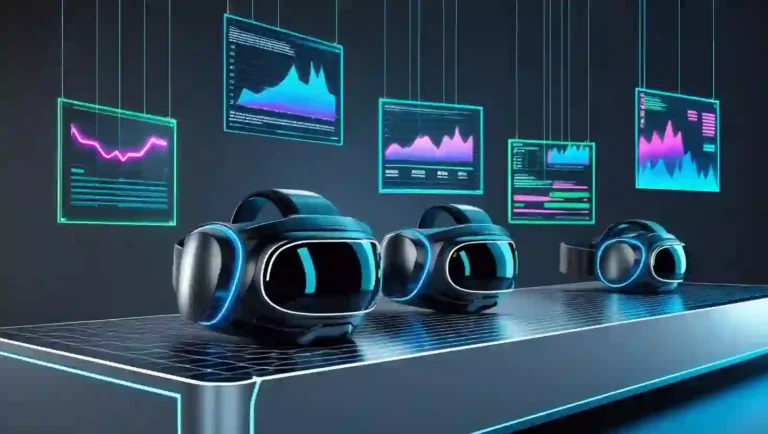AR and VR are the future of how one will engage with the digital world and these technologies are changing the way people are going to consume the digital content. But here’s the catch—how do you make sure people find your amazing AR/VR experiences online? That’s where AR/VR SEO 2025 comes in. By 2025, search engines will focus more on the quality of content and whether or not it can provide value to the user in the form of immersive and natural experiences. Let’s find out what this means for businesses, creators, and marketers who want to be future-ready.
Search engine optimization isn’t just about keywords anymore. It is all about creating valuable and interactive content that can actually appeal to the audience. AR and VR have finally started to become popular, and thus optimizing these formats is no longer a nice-to-have, it is a must-have. This guide will help you learn all there is to know about optimizing your immersive content to rank higher in 2025 and beyond.
Understanding the Basics of AR/VR SEO
Augmented reality (AR) together with virtual reality (VR) have become reality in the present day and their integration shifts users’ interactions with digital content. AR adds virtual elements to real environments by functions which resemble Snapchat effects and allow you to virtually place IKEA furniture in your setting. The users who enter virtual reality experience complete fabricated environments such as gaming realms or virtual travel destinations. Companies have endless possibilities through these technologies yet they need AR/VR SEO 2025 to achieve proper online visibility. The evolution of search engines at Google has made it possible to effectively index immersive content so users can discover their needs in a quicker and more natural way.
AR/VR SEO 2025 functions as a vital element because it enables users to connect their search goals with modern technological solutions. Users who search for “top hiking paths close to me” serve as an example. The smartphone camera view of users gets enhanced trail paths from an AR-enabled map instead of traditional blog post choices. Current users seek personalized engagement alongside search engine approval because both parties prefer highly customizable systems. Your improved AR/VR content gives you an advantage over competitors who maintain text-based methods alone.
Why User Experience Is Key in AR/VR SEO
When it comes to AR/VR SEO 2025 , user experience (UX) isn’t just a buzzword—it’s the backbone of success. Think about it: if your VR simulation glitches or your AR app takes forever to load, users will abandon it within seconds. Search engines track metrics like bounce rates, session durations, and click-through rates to determine the quality of your content. Poor UX signals low value, which can hurt your rankings significantly. On the flip side, smooth, engaging experiences encourage users to stay longer, explore more, and even share your content organically.

One positive aspect of focusing on UX in AR/VR SEO is the opportunity to create memorable interactions. For instance, consider a virtual showroom where customers can “walk” through a car model, customize colors, and inspect details up close. Such features not only enhance satisfaction but also build trust and authority—key components of E-E-A-T guidelines. Additionally, incorporating accessibility features like voice commands or gesture controls ensures inclusivity, broadening your audience reach. As Bill Gates once said, “Content is king,” but in the context of AR/VR SEO, “Experience is emperor.”
Crafting Compelling Content for AR/VR Platforms
To reach success with AR/VR content creation users must abandon their traditional SEO strategies in favor of story-based techniques. Users benefit more from guided interactive stories than from traditional paragraph writing. Such a VR application enables museums to use temporal transportation by letting visitors experience historical events as they unfold first-hand. Immersive storytelling through these platforms holds viewers for extended durations compared to traditional static formats. The integration of appropriate keywords into the AR/VR experience should be done in a natural way to achieve AR/VR SEO 2025 success. Search engines understand the content purpose through keywords such as “historical VR tour” and “interactive learning module.”
Another feature that boosts SEO is multimedia integration. Combining visuals, audio, and text creates richer experiences that appeal to diverse learning styles. For instance, an AR app teaching anatomy could display 3D models alongside detailed explanations. Optimizing these assets involves using descriptive alt texts, captions, and metadata to ensure search engines index them correctly. Positive aspects of this approach include increased dwell time and reduced bounce rates, both of which signal high-quality content to algorithms. “People will forget what you said, but they’ll never forget how you made them feel.” Make your AR/VR content unforgettable.
Technical SEO Tips for AR/VR Content
Technical SEO is the unsung hero of AR/VR SEO 2025 , ensuring your content performs flawlessly across devices. One critical feature is optimizing load times. Slow-loading apps frustrate users and lead to higher abandonment rates, which negatively impact rankings. Compress large files, leverage browser caching, and use content delivery networks (CDNs) to speed things up. For example, reducing the size of 3D models without sacrificing detail can drastically improve performance.
Another important aspect is mobile optimization. Since many AR experiences occur on smartphones, responsive design is non-negotiable. Test your content rigorously on various screen sizes and operating systems to ensure compatibility. Implementing structured data—or schema markup—is another powerful tool. It tells search engines exactly what type of content you’re offering, whether it’s a VR simulation or an AR filter.
Leveraging Social Media for AR/VR Promotion
Social media platforms are goldmines for promoting AR/VR content. Instagram filters, TikTok effects, and Snapchat lenses are all examples of AR in action. Sharing bite-sized previews of your immersive experiences can drive curiosity and clicks.

Engagement matters too. Encourage users to share their interactions with your AR/VR content. User-generated content acts as social proof and amplifies reach organically. Collaborate with influencers who align with your brand values to tap into their audiences. As Seth Godin wisely noted, “Marketing is no longer about the stuff you make but about the stories you tell.”
Measuring Success with Analytics
To truly excel at AR/VR SEO 2025 , you must measure success systematically. Analytics tools like Google Analytics, Adobe Analytics, and specialized AR/VR platforms provide invaluable insights into user behavior. Metrics such as session duration, interaction depth, and completion rates reveal how well your content resonates. For example, tracking how many users finish a VR tutorial versus dropping midway highlights areas for improvement.
A key feature of analytics is its ability to inform iterative improvements. Regularly analyze data to identify patterns and pain points. If users struggle with navigation in your AR app, simplify the interface. Conversely, if certain features receive high engagement, expand upon them. Another positive aspect is the competitive edge gained through data-driven decisions. By continuously refining your content based on real-world feedback, you stay ahead of trends and maintain relevance.
Building Authority Through Thought Leadership
Establishing authority is a cornerstone of effective AR/VR SEO 2025 . Thought leadership positions you as a trusted expert, enhancing both credibility and visibility. Share insightful articles, host webinars, or speak at industry conferences about emerging AR/VR trends. For example, discussing the role of AI in personalizing AR experiences showcases your expertise and attracts attention from both users and search engines.

Guest posting on reputable sites amplifies your reach while earning valuable backlinks. Ensure your contributions offer genuine value rather than being overly promotional. For instance, write a case study detailing how your company implemented AR to boost sales. Backlinks from authoritative domains signal trustworthiness to search engines, improving domain authority. A positive aspect of thought leadership is its long-term impact. Once established, your reputation continues to grow, driving sustained traffic and conversions.
Staying Ahead of Competitors
In the fast-evolving landscape of AR/VR SEO 2025 , staying ahead requires constant innovation. Keep tabs on competitors’ strategies but focus on identifying unmet needs. Perhaps there’s demand for localized VR tours or niche AR applications tailored to specific industries. Addressing these gaps positions you as a pioneer rather than a follower.
Investing in cutting-edge tools and technologies gives you an edge. For example, AI-driven personalization tailors AR/VR experiences to individual preferences, enhancing engagement. Stay updated on algorithm changes and adapt swiftly to maintain visibility. A positive aspect of proactive innovation is future-proofing your business. By embracing new trends early, you build resilience against market shifts.
Ethical Considerations in AR/VR Development
Ethics play a pivotal role in successful AR/VR SEO 2025 strategies. Misleading claims or intrusive ads damage trust and harm reputations. Always disclose sponsored content clearly and respect user privacy. Collect only necessary data and secure it properly to prevent breaches. Transparency fosters lasting relationships with users and aligns with E-E-A-T guidelines, boosting credibility.
A key feature of ethical development is inclusivity. Ensure your AR/VR content is accessible to all, regardless of physical abilities. Incorporate features like voice commands or adjustable settings to accommodate diverse needs. A positive aspect of prioritizing ethics is enhanced brand loyalty. Users appreciate honesty and fairness, leading to repeat visits and referrals. As Warren Buffett reminds us, “It takes 20 years to build a reputation and five minutes to ruin it.” Protect yours by doing the right thing.
FAQs
Q1: What exactly is AR/VR SEO?
AR/VR SEO refers to optimizing augmented and virtual reality content for search engines. Unlike traditional SEO, it focuses on experiential factors like interactivity and immersion. By 2025, search engines will heavily weigh these aspects due to growing consumer demand for dynamic content.
Q2: How do I optimize my AR/VR app for search engines?
Start by including relevant keywords in titles, descriptions, and tags. Optimize loading speeds and ensure compatibility across devices. Use structured data to highlight AR/VR elements and encourage user reviews to boost credibility.
Q3: Can small businesses benefit from AR/VR SEO?
Absolutely! Small businesses can leverage affordable AR tools like Shopify’s 3D product viewer to enhance customer experiences. Even simple implementations, like virtual try-ons, can significantly impact sales and SEO performance.
Q4: Are there any risks involved in AR/VR SEO?
Yes, poorly executed AR/VR content may lead to high bounce rates or negative feedback. Overloading users with complex features can backfire. Always prioritize usability and gather feedback to refine your offerings.
Q5: Will voice search affect AR/VR SEO in 2025?
Definitely. Voice assistants like Alexa and Siri increasingly integrate with AR/VR devices. Optimizing for conversational queries ensures your content remains discoverable. Focus on natural language patterns and long-tail keywords.
Conclusion: Embrace the Future of SEO
The necessity of AR/VR SEO for upcoming years far surpasses the realm of being optional because it has become mandatory. The path to success includes both developing immersive user experiences and implementing analytical tools and ethical approaches as well as all other possible steps. The path of advancement leads to those who introduce innovation without fear and welcome transformative change.
Prepare yourself today because the time for preparation has arrived immediately. The present moment demands every marketer, business owner and content creator to put resources into AR/VR solutions. Your SEO ranking along with connection-building with your audience will improve through these actions.






